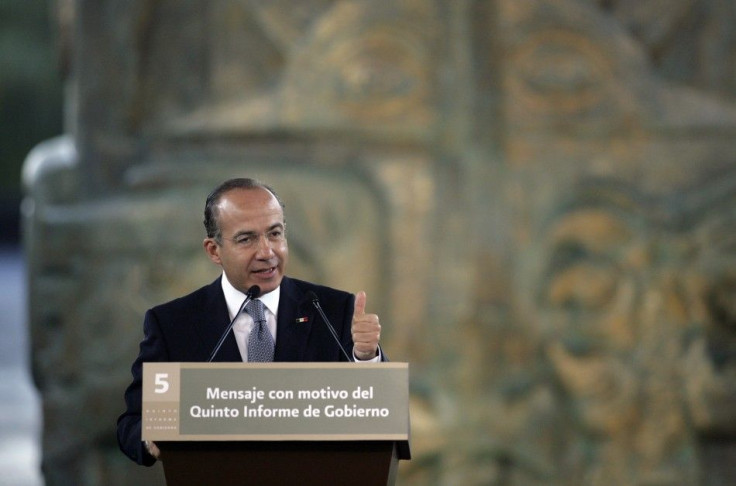Mexico's President Calderon to Keep Fighting Drug War

Mexico's President Felipe Calderon defended his controversial and violent offensive against drug cartels, a war that has cost the country nearly 50,000 lives since he was elected in 2006.
Calderon called the drug trade and the prevalence of powerful, armed gangs that have allegedly been tampering with elections an open threat to democracy, and a threat to everyone.
The first obligation of a government is to guarantee the security and the rights of the citizens, Calderon said. We have done that, and we are going to continue defending the citizens until the last day of my term.
Last month, drug traffickers disrupted local elections in the Michoacan state, where they intimidated voters and told them whom to vote for. This type of corruption is new, but shows an old style of corruption still employed by the cartels -- the buying of politicians, judges and police officers.
A July report that found that more than 400 police officers and investigators nationwide had been fired over corruption allegations. Additionally, 19 local mayors have been murdered in the past year and a number of politicians have disappeared or been killed, presumably because they refused to cooperate with cartels.
In response, Calderon has sent out thousand of troops to some states to combat the cartels.
“Those who say that it would’ve been better not to confront the criminals are roundly mistaken,” Calderon said in his speech Sunday.
“If we hadn’t done this, the criminals would have advanced on our societies and institutions.”
Despite his strong rhetoric, many in Mexico are fed up with the consstand barrage of violence and death that has plagued their country in recent years and condemned Calderon's strategy. In November, a group of activists implored the International Criminal Court to put Calderon on trial for 470 counts of human rights abuses.
What we are denouncing are behaviors that are becoming systematic in the Army and Armed Forces such as rape, forced disappearances, killing of civilians and cover-ups of these killings. A series of a disturbing number of violations against international humanitarian laws lead directly to Felipe Calderon's responsibility, Netzai Sandoval, a lawyer representing the activist group, told CNN Mexico.
It's hard to show results in a war that has claimed so many people, especially when drug trafficking and murder is still as prevalent as ever, but Calderon's administration has made a significant number of important arrests, including the heads of many of the Western hemisphere's most powerful criminal organizations.
An impressive 21 of the 37 most wanted criminals in Mexico have been either captured or killed during Calderon's five-year term.
However, when arresting (or shooting and killing, as often happens) crime bosses doesn't always have the positive effect intended. The space at the top of a gang invites divisions among the group and a battle for power typically ensues. Often cartels split into rival organizations and hundreds are killed in the subsequent struggle for territory.
It is evident that we are not facing common criminals. We are facing true terrorists who have surpassed not only the limits of the law but basic common sense and respect for life, Calderon said during a State of the Union address in September.
During his speech Calderon again promised to not waver on his offensive against drug cartels and insisted that he would not change his strategy. He also motioned to the country's congress to pass a security bill that would unify police forces in Mexican states, consolidating the 2,000 local law enforcement agencies down to a managing 32 forces.
© Copyright IBTimes 2024. All rights reserved.





















